 Explore the psychological processes involved in human development.
Explore the psychological processes involved in human development.
This enables you to better see the things that education can influence in a positive way.
People need to learn different things at different stages of life. When you understand this you understand what is best taught and how it is best taught at different stages.
Save
Lesson Structure
There are 10 lessons in this course:
-
Introduction - Theoretical approaches and key concepts Lifelong growth, nature/nurture; theories - psychodynamic, behavioural, social cognitive, cognitive, lifespan
-
Early childhood - cognitive & social development in the first 6 years Genetics, personality, cognition, recognition, memory, social relationships;
-
Middle childhood - cognitive, moral & social development in the school years Motor skills, cognitive and language development, relationships with family and peers, moral development
-
Challenges of middle childhood School and learning, sense of self, achievement, peer pressure, family breakup, grief and trauma
-
Adolescence - cognitive, moral and social development Cognitive development, moral development, identity, relationships with family and peers;
-
Challenges of adolescence Sexuality, peer groups, identity vs role confusion, trauma, depression, values and meaning
-
Adulthood - cognitive and psychosocial development in early and middle adulthood Sexuality, parenthood. work and achievement, moral reasoning, gender roles, cultural perspectives, adult thinking
-
Challenges of adulthood Marriage and divorce, grief, depression, parenting, dealing with change
-
Late adulthood - cognitive and psychosocial changes in the elderly Intelligence, learning and age, physiological influences, cognitive abilities, personality changes, relationships
-
Challenges of late adulthood Loss, mourning, depression and elderly suicide, aging brain - dementia etc, integrity vs despair, loss of independence.
What Influences a Person's Development Most?
 Is development determined by nature or nurture? This question has been under much debate since before psychology emerged as a science. Although today, most developmental psychologists agree that development is a result of both nature AND nurture, the relative strength of influence from each is still under scrutiny.
Is development determined by nature or nurture? This question has been under much debate since before psychology emerged as a science. Although today, most developmental psychologists agree that development is a result of both nature AND nurture, the relative strength of influence from each is still under scrutiny.
In the early twentieth century there was much debate about how much of our behaviour was due to nature (genetic maturation) and how much was due to nurture (learning). We now know that these two influences interact to produce different behaviours, attitudes, and personalities. Nevertheless, the debate continues to be vigorous.
Lifespan Development
Development is one of those familiar concepts that seeps almost unnoticed into the conversations of many in the fields of psychology, education, and counselling. They are self-evidently concerned with the development of people. But what is development? Are there particular stages that we pass through in our life course? As stated in the above there are theories and ideas to we develop.
We need to address the fact of how to define what development means. The first and obvious element is change - that development involves movement from one state to another. As a result an interest in development leads one to a concern for transitions. Again nature and nurture both play a part in our development as well as our lifespan development.
When researching why people develop as they do, scientist usually consider four interactive forces:
- Biological forces
- Psychological forces
- Sociocultural forces
- Life cycle forces
Each being is a unique and special combination of these forces. No two of us are alike. Not even twin siblings. These forces affect each one of us differently and with different impact.
Development in Infancy and Childhood
It does not take an expert to observe the many magnificent changes that take place in a human being from the time of birth through early childhood and beyond. Parents lovingly mark these changes in baby books and with photographs. Other relatives remark at the new abilities that babies seem to acquire daily. While parents may have just one or a few children to observe, developmental psychologists study many more. By studying many children over time, experts can chart the changes, and then begin to explain how they occur.
Understanding Development is a Basis for Learning
This course is an excellent program for anyone dealing with children, teenagers, or even adults, who has a need or desire to better understand how people learn, adapt and change as the move through the various stages of life.
Save
